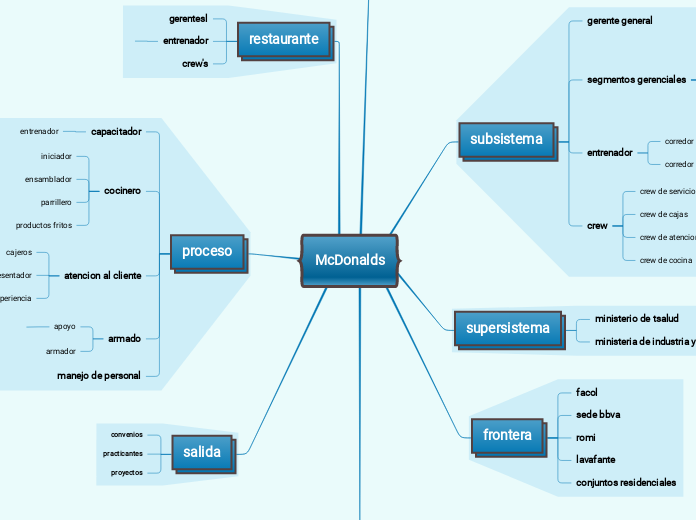av sebastian cuervo för 3 årar sedan
241
McDonalds
En un entorno donde los sistemas juegan un papel crucial, se observa cómo las organizaciones, como McDonald's, estructuran sus operaciones para garantizar un servicio eficiente y de calidad.

av sebastian cuervo för 3 årar sedan
241

Mer av detta
Están constituidos por conceptos que son ajenos a la realidad y que resultan meramente abstractos. Por ejemplo: un sistema operativo.
Se caracterizan por su hermetismo, ya que no generan ningún intercambio con el ambiente, por lo que no se ven afectados ni ejercen influencia en él. Tienen un comportamiento totalmente programado y determinado. Por ejemplo: una olla a presión.
Se caracterizan por establecer intercambios con el medio ambiente que los rodea, para lograrlo, se valen de salidas y entradas por las que intercambian, de manera constante, energía y materia. Por ejemplo: un bosque.
No dependen de la mano de obra del hombre para originarse. Por ejemplo: un animal.
Son producto de la creación humana, por lo que dependen de la presencia de otros para poder existir. Por ejemplo: un reloj.
Se caracterizan por estar compuestos por subsistemas, lo que vuelve difícil la tarea de identificar los distintos elementos que los componen. Por ejemplo: el planeta Tierra.
Se caracterizan por no contar con subsistemas, lo que permite identificar fácilmente sus elementos constitutivos. Por ejemplo: una banda de goma.
Se caracterizan por carecer de movimiento. Por ejemplo: una roca.
Se caracterizan por evolucionar con el tiempo. Por ejemplo: una célula.
The part of speech is a category to which a word is assigned according to its syntactic functions. In English the main parts of speech are noun, pronoun, adjective, determiner, verb, adverb, preposition, conjunction, and interjection.
An interjection is used to express emotion in a sentence.
Think of other interjections!
An adverb is used to describe a verb, but it can also describe an adjective or another adverb.
Adverbs normally help paint a fuller picture by describing how something happens.
The intensifiers strengthen adverbs adjectives and adverbs and down- toners make them weaker.
A numeral is a word or phrase that describes a numerical quantity.
Some theories of grammar use the word 'numeral' to refer to cardinal numbers that act as a determiner to specify the quantity of a noun, for example the 'two' in 'two hats'.
An article is a word used to modify a noun, which is a person, place, object, or idea. Technically, an article is an adjective, which is any word that modifies a noun.
Indefinite articles are the words 'a' and 'an.' Each of these articles is used to refer to a noun, but the noun being referred to is not a specific person, place, object, or idea. It can be any noun from a group of nouns.
It refers directly to a specific noun or groups of nouns.
A pronoun is a word that can be used in place of a noun, typically after the noun itself has already been stated.
Reciprocal pronouns are used for actions or feelings that are reciprocated. The reciprocal pronouns are each other and one another.
A reflexive pronoun ends with ...self or ...selves and refers to another noun or pronoun in the sentence (usually the subject of the sentence). The reflexive pronouns are myself, yourself, herself, himself, itself, ourselves, yourselves, and themselves.
Demonstrative pronouns are used to demonstrate (or indicate). This, that, these, and those are all demonstrative pronouns.
Possessive pronouns are used to show possession. The possessive pronouns are mine, yours, his, hers, ours, and theirs.
The personal pronouns are I, you, he, she, it, we, they. More often than not (but certainly not always), they replace nouns representing people.
An adjective is a word that's used to describe a specific noun and to provide more detail to the listener.
Superlative adjectives demonstrate a higher level of comparison between entities.
Expresses a comparison between two entities or groups of entities in quality or degree.
A noun is defined as a person, place, thing or idea. Proper nouns always begin with a capital letter. Common nouns, which are general words, such as 'cars,' are not capitalized.
Compound nouns are words where two nouns have been stuck together to make a new noun. Compound nouns should be written as one word, without a hyphen.
A noun which refers to a group of things/people.
Countable nouns are nouns that can be counted, even if the number might be extraordinarily high.
Uncountable nouns are nouns that come in a state or quantity which is impossible to count; liquids are uncountable, as are things which act
like liquids.
Proper nouns are the names of specific people or places. They should always begin with a capital letter.
A verb is an action word or 'doing' word that signifies movement in some way.
A modal is a type of auxiliary (helping) verb that is used to express: ability, possibility, permission or obligation. The main modal verbs in the English language are: can, could, may, might, must, shall, should, will, would.
A linking verb connects the subject with a word that gives information about the subject, such as a condition or relationship.
A verb with its own meaning: a verb that is not an auxiliary verb.